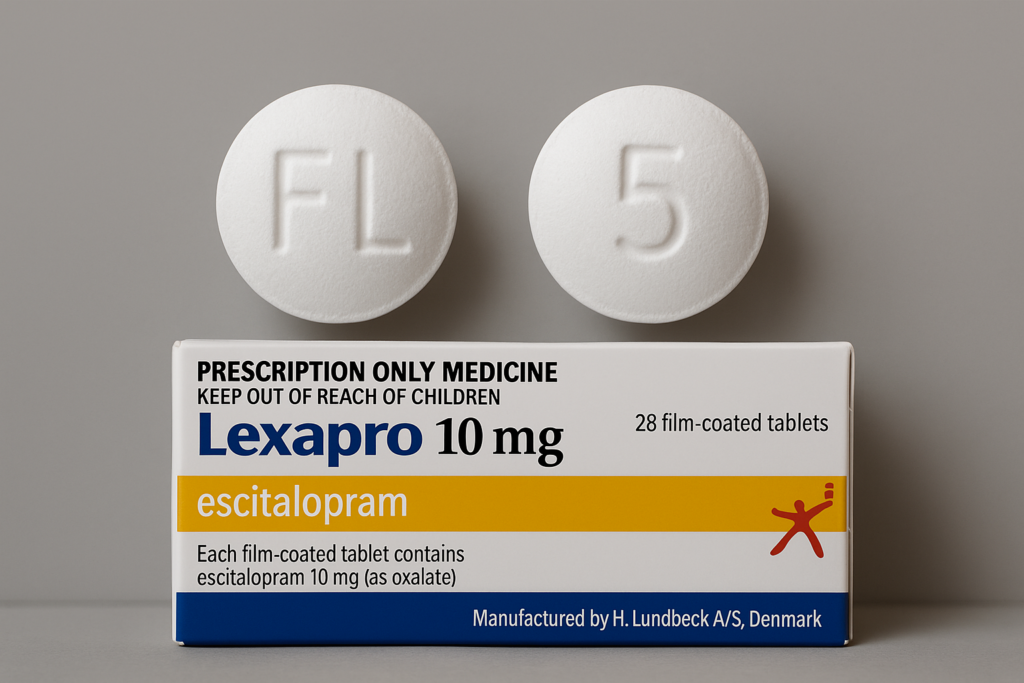lexapro for adhd: Lexapro Uses, Dosage, Side Effects & Warnings Medication Overview
Struggling to Focus? You’re Not Alone in Considering Lexapro for ADHD
If you’re living with ADHD, every day can feel like a mental tug-of-war; your mind races ahead, but your focus, memory, and motivation lag. You might wake up with the best intentions, only to find yourself overwhelmed by unfinished tasks, scattered thoughts, or emotional outbursts that seem impossible to control. Sound familiar?
You’ve likely tried the standard treatments, maybe cognitive behavioral therapy, time-management hacks, even stimulant medications. And yet, the results haven’t quite clicked for you. That’s where the conversation around Lexapro for ADHD begins to take shape. As more people explore off-label options, this commonly prescribed antidepressant is gaining attention for its potential to ease some of the emotional and cognitive challenges tied to ADHD.

Table of Contents
In this guide, you’ll find an honest, research-backed look at how Lexapro works, why it’s being used by some for ADHD, and what you should know before considering it yourself. Because when you’re navigating a condition as complex as ADHD, you deserve answers that are clear, practical, and designed to help you make informed decisions about your mental health.
What Is Lexapro? A 2025 Overview You Can Trust
Lexapro Explained
When you hear the name Lexapro, you’re likely thinking of a medication used to treat depression or anxiety. And you’d be right, Lexapro, known generically as Escitalopram, is a widely prescribed antidepressant that belongs to a class of drugs called Selective Serotonin Reuptake Inhibitors (SSRIs).
Originally approved by the FDA to treat Major Depressive Disorder (MDD) and Generalized Anxiety Disorder (GAD), Lexapro works by increasing the levels of serotonin in your brain, a chemical that plays a key role in mood regulation, emotional stability, and even focus.
While it wasn’t designed specifically for ADHD, its impact on emotional processing and mental clarity has sparked growing interest in its potential off-label use for those struggling with attention and impulse control issues.
Understanding what Lexapro is and isn’t is the first step in deciding whether it’s worth exploring as part of your ADHD management strategy.
ADHD Medications for Adults: People with Anxiety and Depression
Can Lexapro Help with ADHD? A Look at Its Off-Label Use
You might be surprised to learn that Lexapro, though not officially approved for ADHD, is being considered by some mental health professionals as an alternative treatment, especially when traditional stimulant medications fall short or cause unwanted side effects. This practice is known as off-label prescribing, and it’s more common than you might think.
So, why Lexapro? The answer lies in serotonin, a neurotransmitter that plays a key role not only in mood regulation but also in executive functions, the mental skills that help you stay organized, manage time, and control impulses. Emerging research, including NIH-backed studies and clinical trials, suggests that boosting serotonin levels may indirectly support better attention and emotional regulation, two areas where individuals with ADHD often struggle.
In 2025, there’s a noticeable trend in psychiatry: more doctors are exploring SSRIs like Lexapro for patients with ADHD who also experience chronic anxiety, mood swings, or emotional sensitivity. While it’s not a cure-all, Lexapro’s calming effects on the nervous system could provide a stabilizing influence that helps you function more effectively day to day.
Still, this approach isn’t suitable for everyone, and it’s crucial to weigh the benefits against potential risks with a qualified professional. But for those who don’t respond well to stimulants or need help managing ADHD-related anxiety, Lexapro may offer a valuable option worth discussing.
How Lexapro Works in the Brain
Understanding Lexapro’s brain function can help you see why it’s being considered in the treatment landscape for ADHD. While traditional ADHD medications target dopamine and norepinephrine, Lexapro works on a different pathway, it increases the availability of serotonin, a neurotransmitter that helps regulate mood, emotional responses, and cognitive flexibility.
By blocking the reabsorption (or reuptake) of serotonin in your brain, Lexapro allows more of this chemical to remain active between nerve cells. This boost in serotonin can lead to greater emotional balance and mental clarity over time.
So, what does this mean for ADHD? While it doesn’t directly enhance attention in the same way stimulants do, Lexapro’s mechanism may help reduce emotional reactivity, anxiety, and impulsive behaviors, which are often intertwined with ADHD symptoms. For some, this leads to a noticeable improvement in focus and self-control, particularly if emotional dysregulation is a major part of their ADHD experience.
If your ADHD feels closely linked with anxiety, irritability, or mood swings, the calming effect of Lexapro could offer a form of support that stimulant medications don’t always provide.
Lexapro vs. Traditional ADHD Medications: What Sets Them Apart?
When comparing Lexapro to traditional ADHD medications like Adderall or Ritalin, you’re looking at two entirely different approaches to managing the same condition. Each targets distinct brain chemicals and delivers unique benefits and challenges for people with ADHD.
Neurotransmitter Focus:
- Stimulants (Adderall, Ritalin):
- Increase dopamine and norepinephrine, which boost attention, alertness, and motivation.
- Work quickly, often within 30 to 60 minutes.
- Lexapro:
- Increases serotonin levels, which helps regulate mood, emotional stability, and anxiety.
- Effects build gradually over several weeks.
Pros of Lexapro for ADHD:
- It may help calm emotional outbursts, irritability, or anxiety commonly tied to ADHD.
- Non-stimulant option for those sensitive to or unresponsive to traditional meds.
- Lower risk of addiction or abuse.
Cons of Lexapro for ADHD:
- Not a first-line ADHD treatment doesn’t directly improve attention span for most users.
- Takes longer to show effects (usually 4–6 weeks).
- Possible side effects like fatigue, nausea, or emotional flatness.
For many, stimulants remain the most effective option for improving core ADHD symptoms like inattention and hyperactivity. But if your ADHD is complicated by anxiety, mood instability, or poor tolerance to stimulants, Lexapro may offer a gentler, more emotionally-focused alternative. It’s all about finding the right fit for your brain and your lifestyle.
adhd and ocd: Differences, symptoms, treatment, and Comprehensive Guide 2025
Lexapro Dosage for ADHD (Off-Label Use)
If you’re considering Lexapro for ADHD, understanding the right dosage is crucial to ensure safety and effectiveness. Since Lexapro isn’t officially approved for ADHD, dosage guidelines typically follow protocols used for anxiety and depression, adjusted carefully by your healthcare provider based on your response.
Starting Dosage (Adult & Pediatric Use)
- Typical starting dose: Between 5 to 10 mg per day
- Most adults begin at 5 mg daily to minimize side effects, with the option to increase gradually.
- For adolescents or younger patients, doctors usually start with the lower end of the range, 5 mg or less, monitoring closely for tolerance and response.
Adjustment Period and Titration Strategy
You won’t see immediate results. Your doctor will likely recommend a titration schedule, gradually increasing the dose over several weeks to find the minimum effective dose with the fewest side effects. This slow approach helps your body adjust and reduces the chance of unwanted reactions such as nausea or dizziness.
Typically, dose adjustments happen in increments of 5 mg every 1 to 2 weeks, depending on how you feel and your symptom improvement. The maximum prescribed dose for off-label ADHD treatment rarely exceeds 20 mg per day.
Remember: Always follow your healthcare provider’s instructions carefully, never adjust your dose without consulting them first. They’ll monitor your progress to balance benefits with any side effects, ensuring Lexapro works best for your unique needs.
Monitoring and Adjustments: What to Expect with Lexapro for ADHD
When starting Lexapro for ADHD, it’s important to have realistic expectations about how and when you’ll notice changes. Unlike stimulant medications that often work quickly, Lexapro’s effects build gradually as your brain chemistry adjusts.
When to Expect Symptom Changes
- Initial improvements in mood and anxiety may appear within 1 to 2 weeks.
- Noticeable changes in ADHD-related symptoms, such as reduced impulsivity or emotional reactivity, typically take 4 to 6 weeks.
- Full therapeutic benefits might take up to 8 weeks, depending on dosage and individual response.
How Long Before Effectiveness Is Noticed
Patience is key. Because Lexapro influences serotonin levels slowly, it requires consistent use and medical supervision during the adjustment period. If you don’t notice improvement after 8 weeks, your doctor might consider dose adjustments or alternative treatments.
Discover the best adhd therapist near me in the United States 2025
Lexapro Dosage by Age Group and Condition
| Age Group | Condition | Starting Dose | Max Dose | Notes |
|---|---|---|---|---|
| Adults | Off-label ADHD | 5–10 mg | 20 mg | Monitor anxiety levels closely |
| Teens (13–17) | Off-label ADHD | 5 mg | 10 mg | Physician oversight critical |
Regular follow-ups with your healthcare provider are essential to track your progress, manage side effects, and adjust dosage as needed for the best results.
Lexapro Side Effects & Warnings: What You Need to Know
When considering Lexapro for ADHD, being aware of potential side effects and safety warnings helps you make an informed choice and prepare for your treatment journey.
Common Side Effects
While many people tolerate Lexapro well, you may experience some of the following side effects, especially during the first few weeks:
- Nausea: Feeling queasy or unsettled in your stomach is common but often improves with time.
- Drowsiness or Fatigue: You might feel more tired than usual, especially when starting or increasing your dose.
- Sexual Dysfunction: Reduced libido, difficulty achieving orgasm, or erectile issues can occur and may persist during treatment.
- Weight Gain: Some users report gradual weight changes, so monitoring your diet and activity can help manage this.
Important Warnings for ADHD Use
- Mood Changes: Lexapro can sometimes increase anxiety or cause mood swings initially, so close monitoring is crucial.
- Suicidal Thoughts: Like many antidepressants, Lexapro carries a warning for increased risk of suicidal ideation, especially in young adults and teens. Immediate medical attention is necessary if you notice worsening mood or suicidal thoughts.
- Drug Interactions: Tell your doctor about all medications and supplements you’re taking to avoid dangerous interactions.
- Withdrawal Symptoms: Do not stop Lexapro abruptly. Gradual tapering under medical supervision is necessary to prevent withdrawal effects like dizziness, irritability, or flu-like symptoms.
By understanding these side effects and warnings, you can better prepare to discuss risks and benefits with your healthcare provider and take proactive steps to manage your health while using Lexapro for ADHD.
Serious Warnings You Should Never Ignore When Taking Lexapro
While many tolerate Lexapro well, it’s critical to understand the serious risks associated with this medication, especially when used off-label for ADHD. Awareness helps you stay safe and seek help if needed.
Risk of Serotonin Syndrome
Lexapro increases serotonin levels, but too much serotonin in your system can lead to serotonin syndrome, a potentially life-threatening condition. Watch for symptoms such as:
- Rapid heartbeat
- High fever
- Agitation or confusion
- Muscle twitching or stiffness
- Shivering or sweating
If you notice any of these signs, seek emergency medical care immediately.
Black Box Warning: Suicidal Thoughts
The FDA mandates a black box warning on Lexapro for increased risk of suicidal ideation, particularly in adolescents and young adults under 25. If you or someone you care about experiences worsening depression, unusual behavior changes, or thoughts of self-harm, contact a healthcare professional without delay.
Withdrawal Symptoms with Abrupt Cessation
Stopping Lexapro suddenly can trigger uncomfortable withdrawal symptoms like dizziness, irritability, nausea, and headaches. To avoid this, always work with your doctor to gradually taper your dose when discontinuing the medication.
Being informed about these serious warnings empowers you to use Lexapro safely and effectively, making it a valuable part of your ADHD treatment plan when prescribed and monitored carefully.
When NOT to Take Lexapro: Crucial Precautions
Knowing when Lexapro is not safe for you is just as important as understanding its benefits. Certain conditions and medications can make Lexapro risky or harmful.
- If You’re Taking MAOIs:
Avoid Lexapro if you are currently using or have recently used Monoamine Oxidase Inhibitors (MAOIs), a different class of antidepressants. Combining these can cause dangerous interactions, including severe high blood pressure or serotonin syndrome. A washout period of at least 14 days is usually required before starting Lexapro after MAOIs. - History of Bipolar Disorder:
If you have bipolar disorder, Lexapro could trigger manic or hypomanic episodes, characterized by extreme mood swings, impulsive behavior, and high energy levels. It’s essential to inform your doctor about any history of bipolar disorder before beginning Lexapro so they can carefully evaluate the risks and monitor you closely.
Always be transparent with your healthcare provider about your full medical history and current medications to ensure Lexapro is a safe option for your ADHD treatment.
Who Might Benefit from Lexapro for ADHD?
Not everyone with ADHD will find Lexapro helpful, but certain patient profiles suggest it could be a valuable part of your treatment plan. Understanding if you fit these categories can guide your conversation with your healthcare provider.
Patient Profiles That May Benefit from Lexapro
- Adults with ADHD and Co-Occurring Anxiety or Depression:
If your ADHD symptoms are compounded by persistent anxiety or depressive episodes, Lexapro’s mood-stabilizing effects might provide dual relief, helping you manage emotional challenges while supporting focus. - Individuals Who Didn’t Tolerate Stimulants:
Some people experience side effects like jitteriness, insomnia, or increased heart rate from stimulant medications. If stimulants aren’t an option for you, Lexapro offers a non-stimulant alternative that may ease symptoms without those risks. - Those with Strong Emotional Dysregulation:
When impulsivity is paired with intense mood swings, irritability, or emotional sensitivity, Lexapro’s serotonin-boosting properties can help calm your nervous system and improve emotional control.
If you recognize yourself in any of these profiles, discussing Lexapro with your doctor could open new doors to better managing your ADHD and improving your quality of life.
Case Examples: Real-Life Experiences with Lexapro for ADHD
Seeing how Lexapro has helped others might give you a clearer picture of whether it could work for you. Here are two anonymized examples illustrating its potential benefits:
Case 1: Adult Female with ADHD and Generalized Anxiety Disorder (GAD)
A 35-year-old woman struggled with both ADHD and persistent anxiety that made focusing at work nearly impossible. After trying stimulants without success, due to increased jitteriness and insomnia, her doctor prescribed Lexapro. Over several weeks, she noticed not only an anxiety reduction but also improved concentration and calmer impulsivity. Lexapro helped her regain control over daily tasks and reduced the mental “noise” that had held her back.
Case 2: Teen with ADHD and High Anxiety Responds Better to Lexapro Than Stimulants
A 16-year-old adolescent diagnosed with ADHD and severe anxiety experienced significant side effects from stimulant medications, including mood swings and appetite loss. Under medical supervision, the teen switched to Lexapro. Within two months, anxiety symptoms decreased substantially, and attention span improved without the unwanted stimulant-related side effects. The family and doctor viewed Lexapro as a safer, more tolerable alternative in this case.
These examples highlight how Lexapro may offer a unique option, especially when anxiety and emotional challenges are intertwined with ADHD symptoms. Always remember, individual responses vary, and close medical guidance is essential.
Real Experiences & Reviews (2025)
When exploring Lexapro for ADHD, hearing from others who’ve walked a similar path can be incredibly reassuring. In 2025, user reviews from platforms like Reddit, health forums, and medication review sites offer a valuable glimpse into real-world results, both positive and cautionary.
What People Are Saying: Lexapro ADHD Reviews
Positive Outcomes:
- Many users report improved emotional regulation, reduced anxiety, and better sleep, which indirectly helps with focus and impulsivity.
- Some share that Lexapro provided relief when stimulants caused intolerable side effects.
- Users often highlight the gentle onset of effects, appreciating the steady mood stabilization over time.
Common Complaints:
- Several reviews mention initial nausea, fatigue, or sexual side effects, which can be discouraging.
- A few users felt Lexapro didn’t sufficiently improve core ADHD symptoms like attention and hyperactivity.
- Others reported a slow timeline, needing patience to see meaningful benefits.
Insights from Healthcare Professionals
Doctors acknowledge Lexapro’s off-label use for ADHD is not mainstream but recognize its value for patients with overlapping anxiety or depression. Many emphasize the importance of personalized treatment plans, combining medication with therapy and lifestyle changes.
If you’re considering Lexapro, these reviews and professional insights can guide your expectations and empower you to have informed discussions with your healthcare provider.
How ADHD Glasses Help Improve Focus and Reduce Sensory Overload? Comprehensive Guide 2025
Lexapro Alternatives for ADHD: Exploring Other Medication Options
If Lexapro doesn’t seem like the right fit for you, or if you’re curious about other treatments, it’s helpful to know the main alternatives used for managing ADHD symptoms. These options target different brain chemicals and work in varying ways.
Non-SSRI Options for ADHD
- Stimulants (First-Line Treatments):
- Adderall (amphetamine salts): Increases dopamine and norepinephrine to boost focus and reduce impulsivity quickly.
- Vyvanse (lisdexamfetamine): A longer-acting stimulant that provides steady symptom control throughout the day.
- Non-Stimulants:
- Strattera (atomoxetine): A norepinephrine reuptake inhibitor that helps with attention and impulse control without the stimulant side effects.
- Wellbutrin (bupropion): An atypical antidepressant that affects dopamine and norepinephrine, sometimes used off-label for ADHD with co-existing depression.
Each alternative has unique benefits and potential side effects, so working closely with your doctor will help you find the medication best suited to your individual needs and lifestyle.
Natural Supplements & Therapies to Support ADHD Management
Beyond medications like Lexapro, many find that natural supplements and therapeutic approaches can complement treatment and improve overall well-being.
Key Supplements That May Help ADHD
- Omega-3 Fatty Acids:
Found in fish oil, omega-3s support brain health and may improve attention and cognitive function. Studies suggest they can reduce ADHD symptoms, especially when combined with other treatments. - Magnesium:
This mineral plays a role in nerve function and calming the nervous system. Low magnesium levels have been linked to increased hyperactivity and irritability, so supplementation might help ease these symptoms.
Effective Therapies
- Cognitive Behavioral Therapy (CBT):
CBT focuses on developing practical skills to manage impulsivity, organization, and emotional regulation. It’s highly recommended as part of a comprehensive ADHD treatment plan.
Lifestyle Changes to Enhance Focus and Mood
- Regular Exercise:
Physical activity boosts dopamine and norepinephrine, key neurotransmitters involved in attention and mood regulation. Aim for at least 30 minutes of moderate exercise most days. - Sleep Hygiene:
Quality sleep is vital. Establishing a consistent sleep schedule, reducing screen time before bed, and creating a calming bedtime routine can dramatically improve ADHD symptoms.
Incorporating these natural strategies alongside medication can help you achieve more balanced, sustained symptom control and improve your daily functioning.
| Pros | Cons |
|---|---|
| May reduce anxiety and improve mood | Not FDA-approved for ADHD |
| Fewer stimulant-related side effects | Potential for sexual side effects |
| Useful for ADHD with comorbid depression | Slower onset of action |
FAQ – Lexapro for ADHD
Is Lexapro FDA-approved for ADHD?
No, Lexapro is not FDA-approved for treating ADHD. Its use for ADHD is considered off-label and prescribed at a doctor’s discretion based on your symptoms and needs.
Can Lexapro worsen ADHD symptoms?
In some cases, Lexapro may cause side effects like fatigue or mental fog, which can feel similar to inattentiveness or brain fog, potentially making ADHD symptoms seem worse. Monitoring how you respond is important.
How long does Lexapro take to work for ADHD symptoms?
You can generally expect to notice improvements within 4 to 6 weeks, though the timeline varies by individual. Patience is key as the medication gradually balances brain chemistry.
Can I combine Lexapro with ADHD medication?
Yes, Lexapro can sometimes be combined with stimulant or non-stimulant ADHD meds, but only under close medical supervision to avoid adverse interactions and to ensure safety. Always follow your healthcare provider’s guidance.
Final Thoughts: Should You Consider Lexapro for ADHD?
Deciding whether I should take Lexapro for ADHD is a personal journey that requires careful consideration. While Lexapro is not officially approved for ADHD, its off-label use can offer meaningful benefits, especially if you struggle with anxiety, depression, or emotional dysregulation alongside your ADHD symptoms.
The key is to work closely with a psychiatrist who understands your unique needs. They can help tailor your treatment, monitor side effects, and adjust dosages safely.
Tracking your symptoms and journaling your progress can empower you to notice subtle changes and communicate effectively with your doctor. Remember, managing ADHD is complex medications like Lexapro are just one part of a broader strategy that includes therapy, lifestyle adjustments, and self-care.
With the right support and tools, you can find a treatment plan that helps you thrive.







